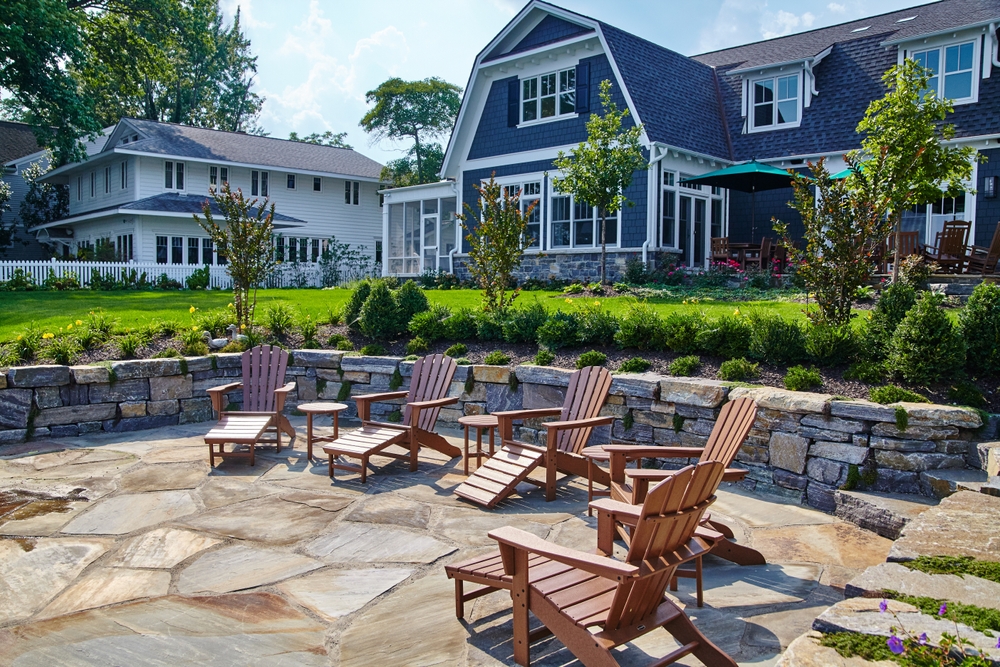
When it comes to elevating outdoor spaces with retaining walls, choosing between wood and masonry is a decision that homeowners should consider carefully. Each material option offers unique benefits and considerations, and making the right choice depends on your goals, property features, and personal style preferences.
With over 15 years of experience transforming outdoor spaces in the Denver Metro Area, we’ve installed countless retaining walls and are here to guide you through the key differences, advantages, and limitations of wood and masonry retaining walls.
Key Takeaways:
- Wood walls offer natural charm and quick installation – Perfect for shorter walls (under 4 feet) with faster setup, but require regular maintenance and typically last 10-15 years
- Masonry walls provide superior durability and structural strength – Ideal for taller installations and heavy-duty applications, lasting decades with minimal maintenance
- Climate matters significantly – Colorado’s freeze-thaw cycles and intense sun exposure make material choice crucial for long-term performance
- Professional installation is essential – Proper drainage systems, reinforced foundations, and expert craftsmanship determine the success and longevity of any retaining wall project
Understanding Retaining Walls
Retaining walls serve essential practical and aesthetic roles in landscape design. Structurally, they hold back soil, prevent erosion, and allow for the creation of stable terraces on sloped properties. From an aesthetic perspective, retaining walls can become visually striking features, adding character and enhancing the overall appeal of outdoor spaces.
Among the materials available, wood and masonry are two of the most popular choices. Each material stands out for specific reasons, so understanding their trade-offs will help you determine the best option for your project.
Wood Retaining Walls – A Blend of Natural Charm and Practical Benefits
Natural Aesthetic:
Wood retaining walls bring a warm, organic feel to landscapes. They blend seamlessly with natural surroundings, creating a rustic, inviting look that works particularly well in shaded areas or wooded properties.
Ease and Speed of Installation:
Installing wood retaining walls is simpler and faster compared to masonry walls. This makes them a great option when time efficiency is important.
Flexibility for DIY Enthusiasts:
For the handy homeowner, wood retaining walls are easier to handle as DIY projects due to their lightweight materials and standard tools required for construction.
Adaptability to Unusual Terrains:
Wood is forgiving when dealing with challenging or uneven terrains. It can be custom-cut on-site to fit specific needs, making it ideal for non-standard wall shapes.
Limitations of Wood Retaining Walls
Shorter Lifespan:
Even when pressure-treated or made of quality cedar or redwood, wood retaining walls generally last about 10-15 years before needing significant repair or replacement.
Higher Maintenance Needs:
Wood requires ongoing maintenance. Regular sealing or staining is vital to protect against moisture, sun exposure, and insects.
Height Limitations:
Wood retaining walls are typically suited for projects under 4 feet high, as taller installations require additional structural support that wood may not effectively provide.
Vulnerability to Harsh Weather:
Climate can take a toll on wood walls, especially in Colorado, where temperature swings, intense sun, and seasonal moisture accelerate wood decay.
Masonry Retaining Walls – Durability and Timeless Appeal
Advantages of Masonry Retaining Walls
Unmatched Longevity:
Masonry walls excel in durability. Properly constructed stone, brick, or concrete block walls can endure for decades, with minimal maintenance required.
Superior Structural Integrity:
Masonry walls are the go-to choice for taller or more heavy-duty applications. They can handle substantial loads, perform well in retaining larger volumes of soil, and are better suited for areas requiring more robust engineering.
Minimal Upkeep:
Maintenance for masonry walls is minimal. Beyond checking for occasional mortar cracks or cleaning, they are low-maintenance features designed to last.
Property Value Boost:
High-quality masonry retaining walls can enhance the value of your property by adding a sense of craftsmanship and long-term investment that appeals strongly to potential buyers.
Endless Design Possibilities:
From classic stonework to sleek modern concrete blocks, masonry walls offer a stunning array of design possibilities to match any architectural style.
Limitations of Masonry Retaining Walls
Higher Installation Requirements:
Masonry walls require skilled labor, robust foundations, and proper drainage systems. While this leads to durability, it also makes them more complex and time-intensive to install.
Substantial Weight:
The significant weight of masonry materials presents additional considerations for properties with unstable or poor soil conditions. Proper engineering is crucial to ensure structural integrity.
Permanent Design Commitment:
Their durability means masonry retaining walls are a lasting decision. Once installed, adjustments or changes to the structure are challenging and can be costly.
Choosing the Right Material for Your Property
After years of experience installing both wood and masonry retaining walls across the Denver Metro Area, we’ve identified key factors to help property owners decide which material is best for them.
Wood Is Ideal When:
- You’re aiming for a natural look that complements trees and greenery.
- The wall will be under 4 feet tall.
- You’re seeking a solution that is faster to install.
- You are prepared for some short- to medium-term maintenance needs.
Masonry Is Ideal When:
- You want a long-lasting investment for your home.
- The wall needs to exceed 4 feet in height to hold back significant loads.
- Your design incorporates a formal or architectural focus.
- Low-maintenance durability meets your long-term priorities.
Colorado’s Climate Considerations
Colorado’s unique environment drastically influences how retaining walls perform. Freeze-thaw cycles can challenge masonry walls without proper drainage, while the high-altitude sun and dry climate speed up wear on wood walls.
Based on our experience, masonry walls provide greater reliability for the south and west-facing walls exposed to intense sun. Meanwhile, wood walls can work effectively when placed in shaded or lower-exposure areas.
Why Professional Installation Matters
Regardless of which material you choose, expert installation is key to a long-lasting retaining wall. At Veteran Patios, we pride ourselves on integrating superior craftsmanship with engineering expertise. Our installations include robust drainage systems, properly reinforced foundations, and high-quality materials tailored to your unique needs.
FAQs About Wood and Masonry Retaining Walls
1. What are the main differences between wood and masonry retaining walls?
Wood retaining walls are known for their natural charm and quick installation, making them ideal for shorter walls under 4 feet. However, they require regular maintenance and have a lifespan of 10-15 years. Masonry retaining walls, on the other hand, offer superior durability, structural strength, and minimal maintenance, lasting for decades. They are better suited for taller walls and heavy-duty applications.
2. Which material is better for Colorado’s climate?
Colorado’s freeze-thaw cycles and intense sun exposure make masonry walls a more reliable choice for long-term performance, especially for south- and west-facing walls. Wood walls can work well in shaded or lower-exposure areas but may require more maintenance due to the harsh climate.
3. Can I install a wood retaining wall myself?
Yes, wood retaining walls are more DIY-friendly due to their lightweight materials and simpler installation process. However, for taller walls or challenging terrains, professional installation is recommended to ensure proper drainage and structural integrity.
4. How long do wood retaining walls last?
With proper maintenance, wood retaining walls typically last 10-15 years. Regular sealing or staining is necessary to protect against moisture, sun exposure, and insects.
5. Are masonry retaining walls worth the investment?
Absolutely. Masonry walls are a long-term investment that adds durability, structural integrity, and property value. While they require skilled labor and a higher upfront cost, their longevity and minimal maintenance make them a cost-effective choice over time.
Elevate Your Outdoor Space
Choosing between wood and masonry retaining walls comes down to balancing practicality, durability, and aesthetics. Both materials offer ways to redefine your landscape and address functional challenges, such as sloped yards or eroding soil.
Whether you’re drawn to the natural charm of wood or the enduring strength of masonry, informed decisions and skilled execution make all the difference.
At Veteran Patios, we bring over 15 years of expertise to help homeowners like you create outdoor spaces that inspire. Contact us today for a free consultation and personalized recommendations.

